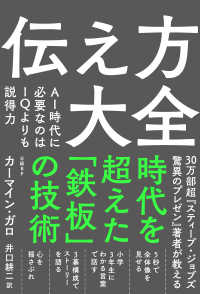- ホーム
- > 洋書
- > 英文書
- > Nature / Ecology
Full Description
More than twenty-five years after the end of apartheid, water access remains a striking reminder of racial inequality in South Africa. This book compellingly argues that in the post-apartheid period inequality has not only been continuously reproduced but also legitimized.
Michela Marcatelli unravels this inequality paradox through an ethnography of water in a rural region of the country. The Waterberg Plateau is a space where agriculture, conservation, and extraction coexist and intersect. Marcatelli examines the connections between neoliberalism, race, and the environment by showing that racialized property relations around water and land are still recognized and protected by the post-apartheid state to sustain green growth. She argues that the government depicts growth as the best, if not only, solution to inequality. While white landowners maintain access to water, however, black ex-farmworkers are dispossessed once again of this essential-to-life resource.
If the promise of growth serves to normalize inequality, the call to save nature has the effect of naturalizing it even further.








